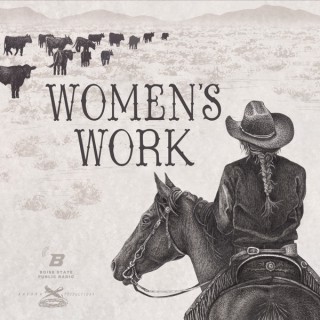Women's Work
Follow Women's WorkJoin Ashley Ahearn as she visits working ranches across the West to meet the women who are reimagining the way we raise meat. There are a lot of problems with the industrial meat system in this country. Ahearn saddles up, microphone in hand, to bring us a
- Oct 10, 2023 LATEST EPISODE
- infrequent NEW EPISODES
- 20m AVG DURATION
- 10 EPISODES
Ivy Insights
The Women's Work podcast is an absolute gem that offers a unique and refreshing perspective on agrarian reform and land-based work. As a listener who consumes a lot of content in this genre, I have found that the episodes of this podcast are the perfect length and always leave me wanting to hear more. This podcast stands out because it focuses specifically on women's stories, which is both encouraging and insightful for someone like myself who is considering transitioning from a corporate job to something land-based. The host's ethnographic style is warm and down-to-earth, making the interviews feel personal yet informative.
One of the best aspects of The Women's Work podcast is how Ahearn connects her stories to larger themes while still maintaining a sensitivity towards her subjects. She demonstrates a deep awareness of important issues surrounding land policy and brings listeners into the moment during her interviews. This level of depth adds great value to each episode and makes them highly engaging for anyone interested in farming, ranching, or homesteading. Additionally, hearing the stories of fellow women ranchers who are making a difference and sharing their knowledge is truly inspiring.
While The Women's Work podcast excels in many areas, one potential drawback is that the episodes could be longer. Given the scarcity of podcasts focused on farming, ranching, and homesteading with a female focus, it can feel disappointing when an episode ends too soon. However, this minor downside does not detract significantly from the overall quality of the podcast.
In conclusion, The Women's Work podcast is a beautiful piece of audio storytelling that deserves recognition and praise. Its sound design, music choices, segues, and excellent writing create an immersive experience for listeners. The wide lens through which each story is told provides context, diverse opinions, and background information that enriches the narrative further. As someone living in an urban environment but curious about rural life, I find this podcast to be an incredible resource with great hosting, heartfelt characters, and artful production. It is truly on par with the caliber of "This American Life" and offers compelling personal stories that are long overdue.
More podcasts from Boise State Public Radio
Latest episodes from Women's Work

Hey Women's Work listeners, Ashley here with a podcast recommendation for you – it's my newest series, Mustang, and it explores the complicated world of wild horses. Here's a sneak preview.

If you liked the deep look in Women's Work at the way women are reimagining how we raise meat in this country, we've got something else you might like: the new season of The Modern West, a podcast from Wyoming Public Media hosted by Melodie Edwards. We've got an episode to share about three women who are taking a more humane approach to running their Wyoming feedlot.

The meat supply chain in this country is broken. Four big companies control more than 80% of the meat packing industry. In the final episode of Women's Work we'll meet a rancher entrepreneur who is reimagining our meat system – and building an alternative.

As more land in rural communities across the West gets gobbled up for housing and development, meet a rancher who's working to protect open space for agriculture … and she's teamed up with a surprising ally.

Beth Robinette is trying to be a “less shitty white person.” For her, that's meant learning about the history of her family's ranch in eastern Washington and the people from whom the land was taken. It's also meant exploring the LandBack movement and building a relationship with the next generation of Native American youth in her area.

When wolves cost the Elzingas thousands of dollars in lost cattle, the family changed everything about how they ranch. Mount up and head into the Idaho backcountry with them to find out how they're keeping the wolves at bay and improving the health of their land in the process.

Kelsey Scott's ancestors had no problem feeding themselves before white settlers arrived on the great plains. Now, she's restoring food sovereignty to her people – the Cheyenne River Sioux – by raising grass fed beef on the reservation and selling primarily to tribal members. Kelsey believes that tribal sovereignty starts with food sovereignty.

Rachel Beaubien says she doesn't know much about birds but she loves the fact that every year, thousands of them land in her irrigated hay fields to rest and refuel on their long migrations. Ranchers in her part of eastern Oregon may be providing some of the last best wetland habitat for birds, but can that continue as the west dries up and tensions rise?A transcript of this episode is available.

Waking up in the middle of the night and missing German class are part of the job when you're a 14 year old sheep rancher. Meet Maloi Lannan of Red Clover Lambs in Montana and find out what the next generation of regenerative ranchers is doing to change ranching in the West.A transcript of this episode is available.

Hey, I'm Ashley. I used to be a vegetarian. Then I moved rural, started meeting ranchers and herding cows on horseback - and wondering: could we raise beef better? That question launched me on a journey, across the west. Turns out, women are leading the charge in the regenerative ranching movement. Come meet them.Projects like these are made possible by Boise State Public Radio members. Give now to support future podcasts.
















